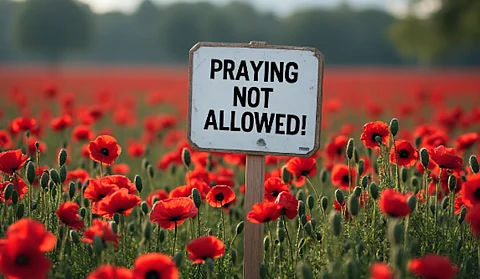

Here we go again.
The Supreme Court of Canada announced Thursday it will hear a challenge to Bill 21, Quebec’s contentious secularism law, setting the stage for yet another landmark constitutional battle over use of the notwithstanding clause to suppress minority rights.
The law, enacted in 2019 by Premier François Legault’s Coalition Avenir Québec (CAQ) government, prohibits government employees in positions of authority — such as teachers, judges, and police officers— from wearing religious symbols, including the Muslim hijab, Jewish kippah, Sikh turban, and Christian cross.
Critics argue that Bill 21 violates the Canadian Charter of Rights and Freedoms, suppressing the rights of religious minorities under the guise of promoting state neutrality.
The irony is that members of Quebec’s legislature, the National Assembly — including Premier François Legault himself — are not subject to the ban.
The National Council of Canadian Muslims, one of the groups challenging the law, vowed to continue fighting until it is repealed. “We will not stop fighting until Bill 21 is struck down,” the organization said.
Similarly the English Montreal School Board (EMSB), condemned the law as contrary to Quebec’s pluralistic values. “Its very adoption was an affront to peaceful coexistence and equality,” said board chair Joe Ortona.
Supporters of the law, including the Mouvement laïque Québécois, argue it upholds state neutrality and ensures religious symbols do not influence public institutions. The group praised the Quebec Court of Appeal’s February 2024 ruling that upheld Bill 21, stating it complies with public law.
Quebec Premier François Legault has touted Bill 21 “beautiful victory for the Quebec nation” but critics complain it makes people of faith ‘second class citizens’.
The irony is that members of Quebec’s legislature, the National Assembly — including Legault himself — are not subject to the ban.
Meanwhile, the Liberal government has signalled its intention to intervene in the case, drawing sharp criticism from Quebec leaders.
Justice Minister Simon Jolin-Barrette and Minister of Secularism Jean-François Roberge accused Ottawa of disrespecting Quebec’s autonomy, warning that federal intervention would amount to “an attack on the federated states’ autonomy” and vowed to defend Quebec’s “primordial” right to enact the law “until the end.”
Bloc Québécois leader Yves-François Blanchet also condemned federal involvement, calling it “profoundly unacceptable” and a sign of Canada’s “incompatibility with Quebec’s values.”
The Legault government has doubled down on its defense of Bill 21, framing the law as a cornerstone of Quebec’s distinct identity that reflects Quebec’s history, social values and “national” aspirations.
